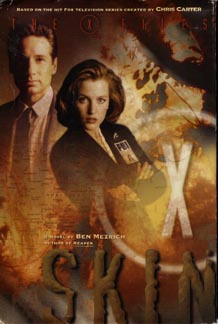The “X-Files” six-book series wraps up with its best work, Ben Mezrich’s “Skin” (1999). It’s a much more layered novel than those from Charles Grant and Kevin J. Anderson, featuring a medical mystery right up Scully’s alley that morphs into a supernatural mystery right up Mulder’s alley. Both agents are in fine form, and “Skin” – like Anderson’s “Ground Zero” and “Ruins” – takes advantage of the “unlimited budget” of the medium to take Mulder and Scully deep into the jungles of Thailand. (Spoilers follow.)
While I was not surprised by any of the goings-on in four of the first five “X-Files” books (the only exception being “Goblins”), “Skin” is refreshingly complex – almost to the point of being confusing, but not quite. A mild-mannered professor receives a skin transplant and goes on a violent spree through New York. When Mulder and Scully, along with local law enforcement, stop him, they backtrack through the skin-transplant process and uncover a cutting-edge medical corporation. They ultimately track the mystery back to the Vietnam War, and to the other side of the globe.
The creepiness of the medical procedure – where victims of horrific burns are kept alive – calls to mind the second movie, “I Want to Believe,” which delves into equally bizarre experiments in search of immortality. “Skin” features a human villain who gets sexual thrills from killing, and it’s the most graphic of the “X-Files” books, featuring not only brain-dead experimental subjects whose skin has been burned off by napalm, but also fresh victims who are skinned. The earliest “X-Files” books were almost young-adult-oriented adaptations of some episodes, and Grant’s and Anderson’s books were a step up from that, but “Skin” is definitely an adult novel. It’s not quite as good as, say, a Preston-Child novel, but it comes closer than any other “X-Files” book.
It probably wouldn’t hold up to scrutiny from a reader with medical knowledge, but Mezrich provides verisimilitude to his material about skin transplants and the idea of a virus being transmitted. His real strengths, though, are locations and characters. He evocatively takes us through a subway-tunnel chase that calls to mind Season 8’s “Medusa,” and then has Mulder and Scully go to Thailand, where they investigate walled-off basements, jungles and ultimately a cave with a secret medical facility carved into it. In addition to the creepy killer – whom the narrator calls “the Amerasian” as per his American and Asian heritage, a term that never really caught on – Mezrich also gives us a brash female NYC detective and other big personalities along the way.
Although Grant and Anderson delivered serviceable versions of the leads, the agents are in particularly fine form under Mezrich’s pen. I can hear Mulder’s sardonic deliveries and Scully’s bemused replies. None of the six books delves too much into the humorous side of “The X-Files,” but if these books were TV scripts, David Duchovny would find the most to play with in “Skin’s” version of Mulder.

It’s interesting to note that the medical-genius villains of “Skin” are ultimately trying to create super soldiers, and Mulder finds compelling evidence that the Defense Department is funding their efforts. In Seasons 8 and 9, the Shadow Government began to focus its attention on creating super soldiers, and in Season 2’s “Sleepless,” we learned that the US government dabbled in removing soldiers’ need for sleep. Any connection between “Skin” and the parent show is no doubt coincidental, but if a fan really wanted to, they could perhaps tie it all together.
“Skin” turned out to be the last original “X-Files” novel, and the last original work of prose fiction until 2015’s short-story collection “Trust No One,” from IDW. The Harper Entertainment book line no doubt ended because of the declining popularity of the show around the same time. It’s too bad, because the quality of the series was on a generally upward trend, concluding with its best and most mature entry.

